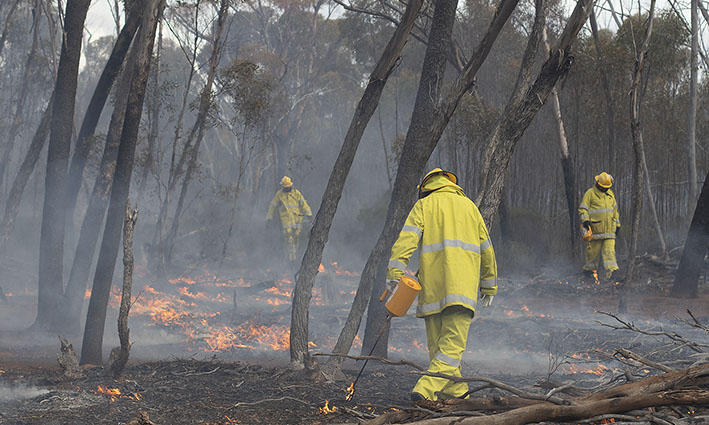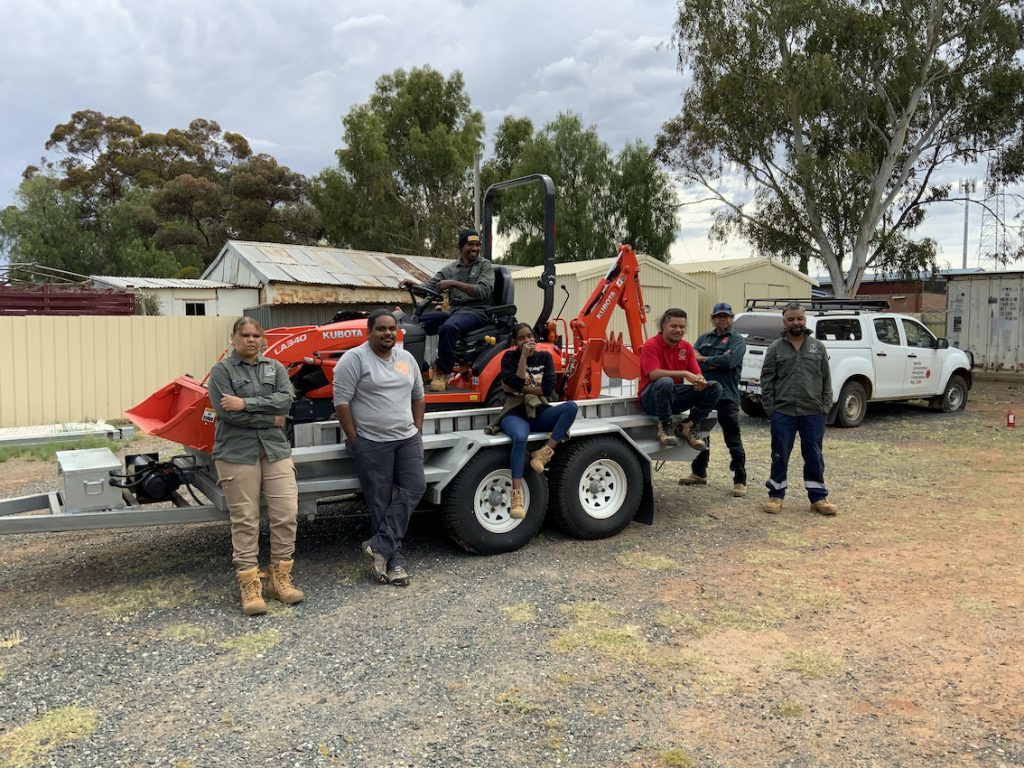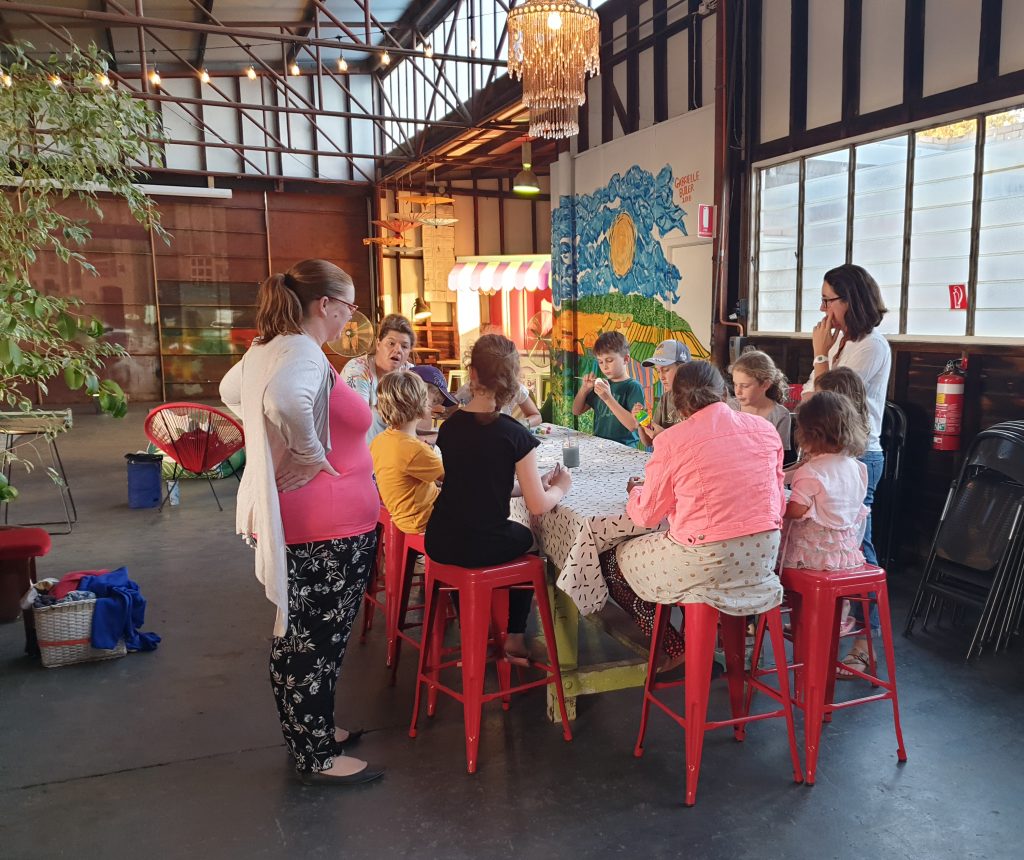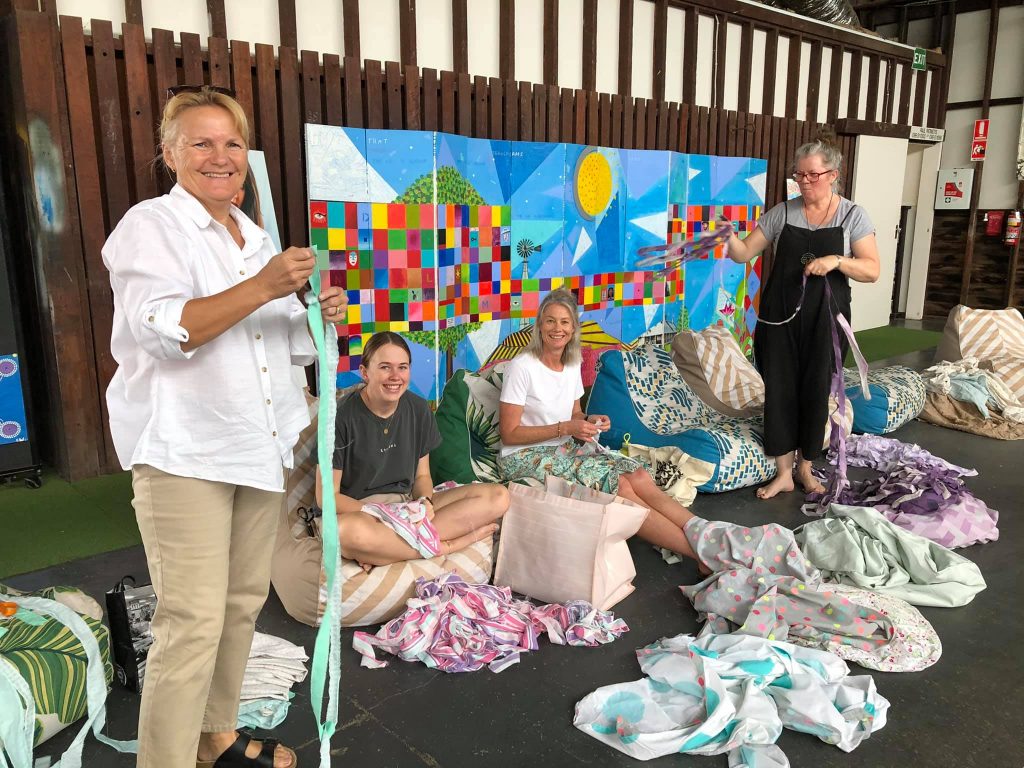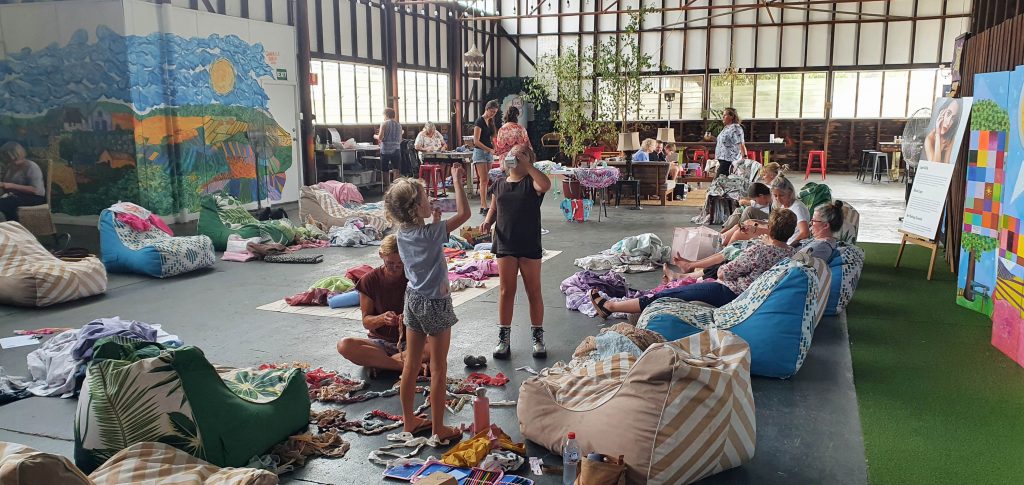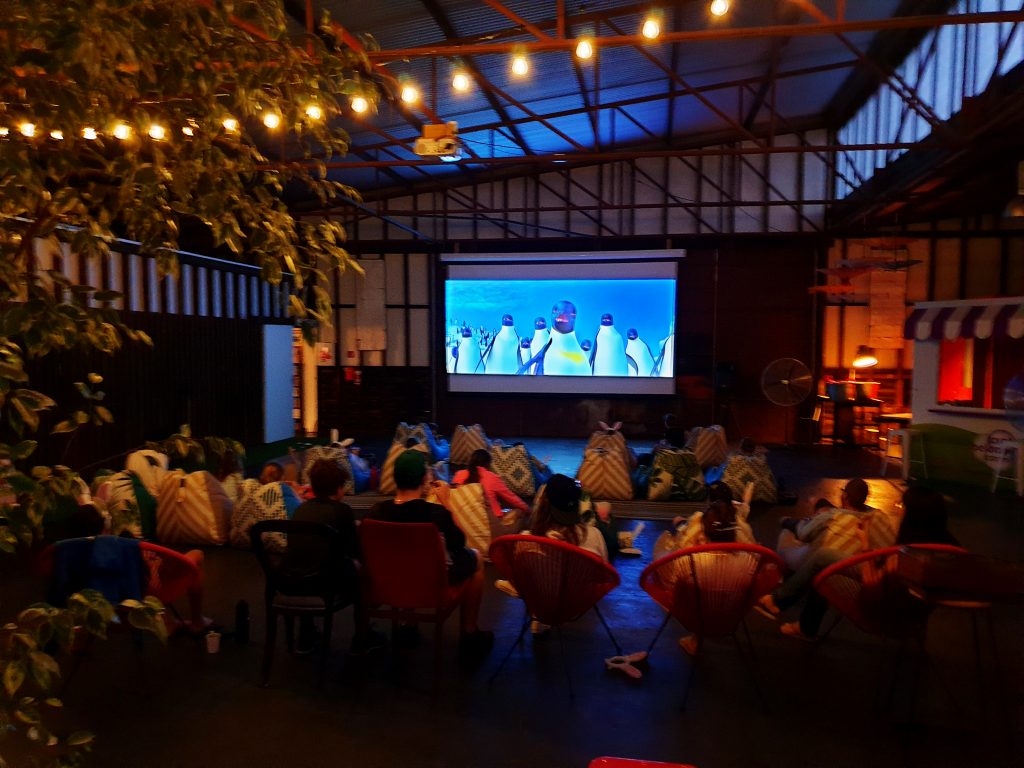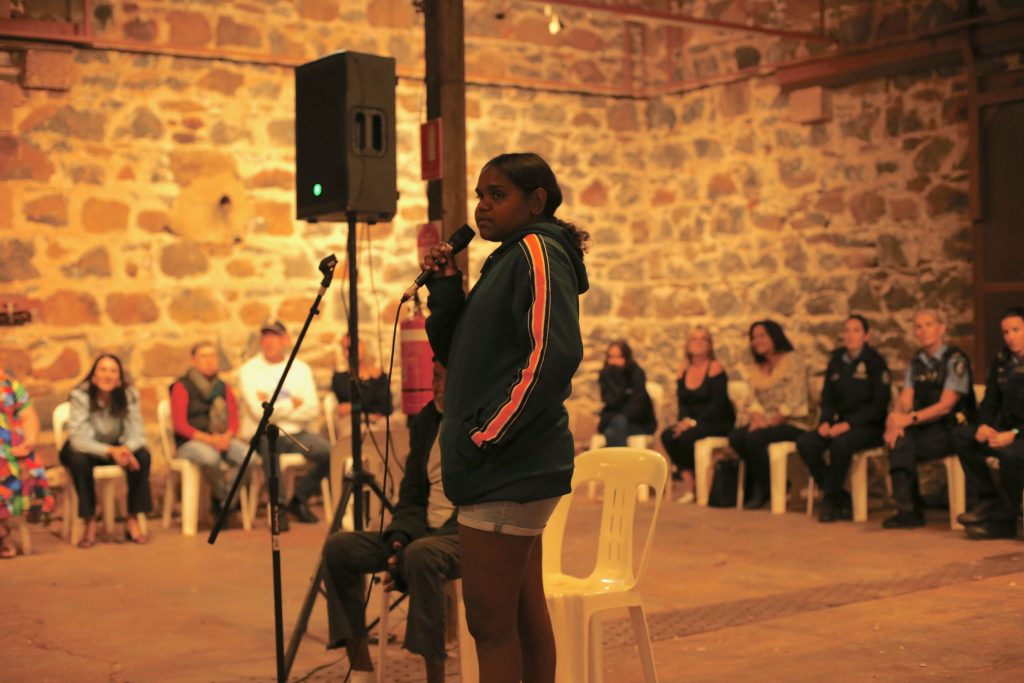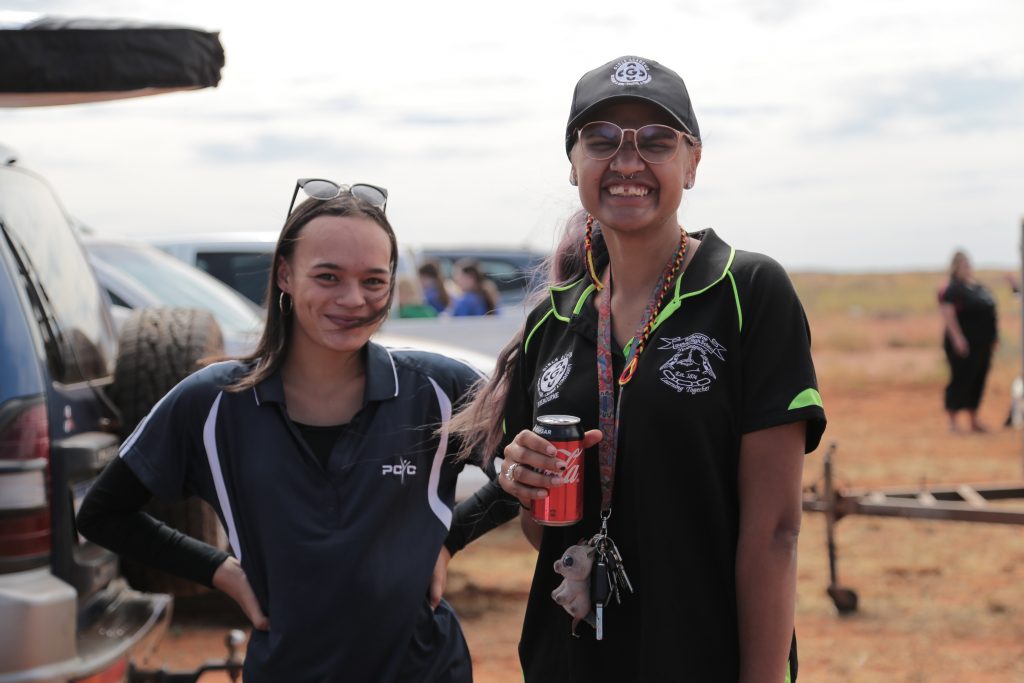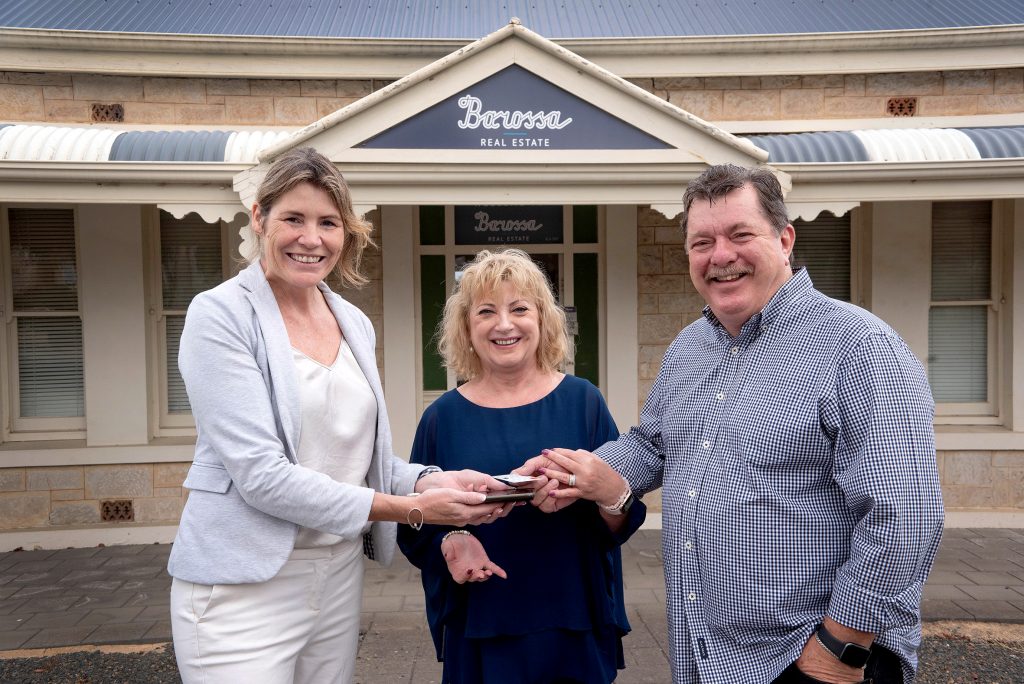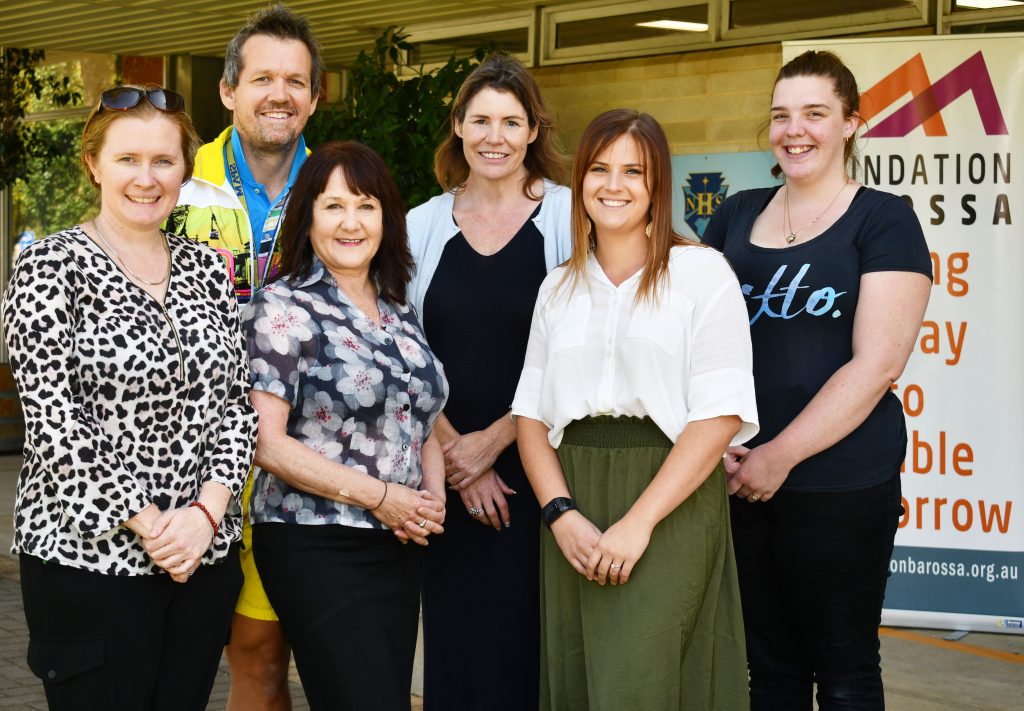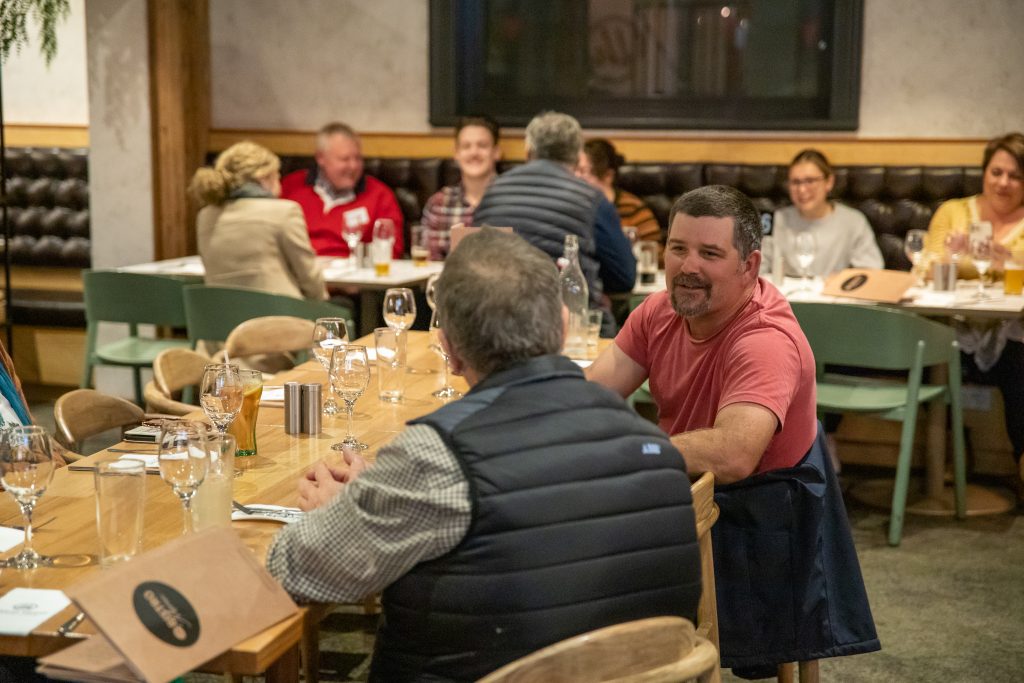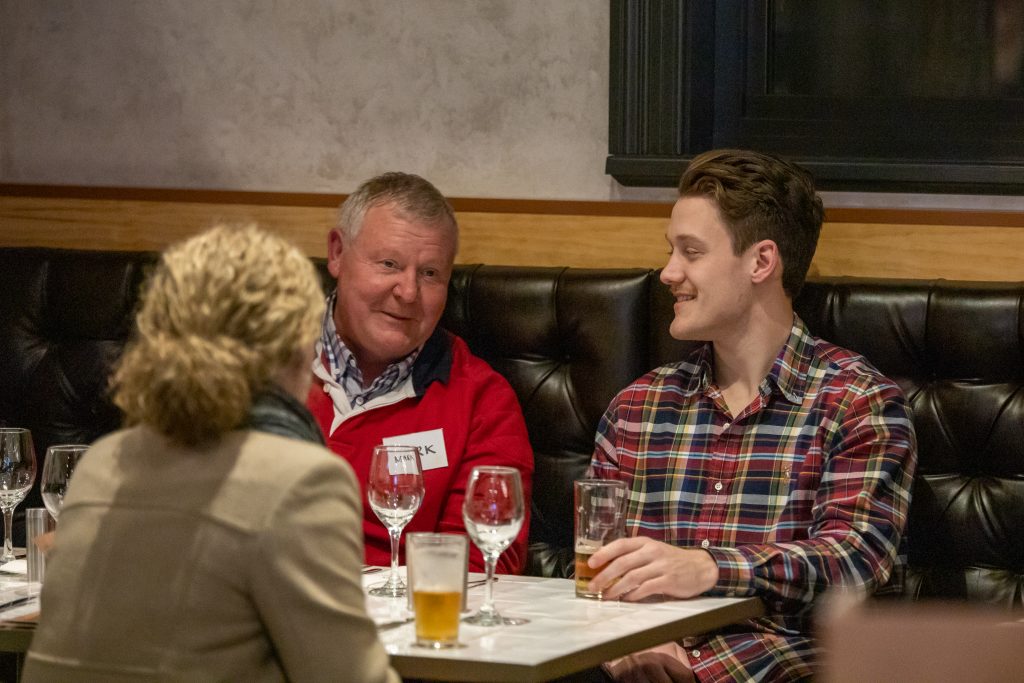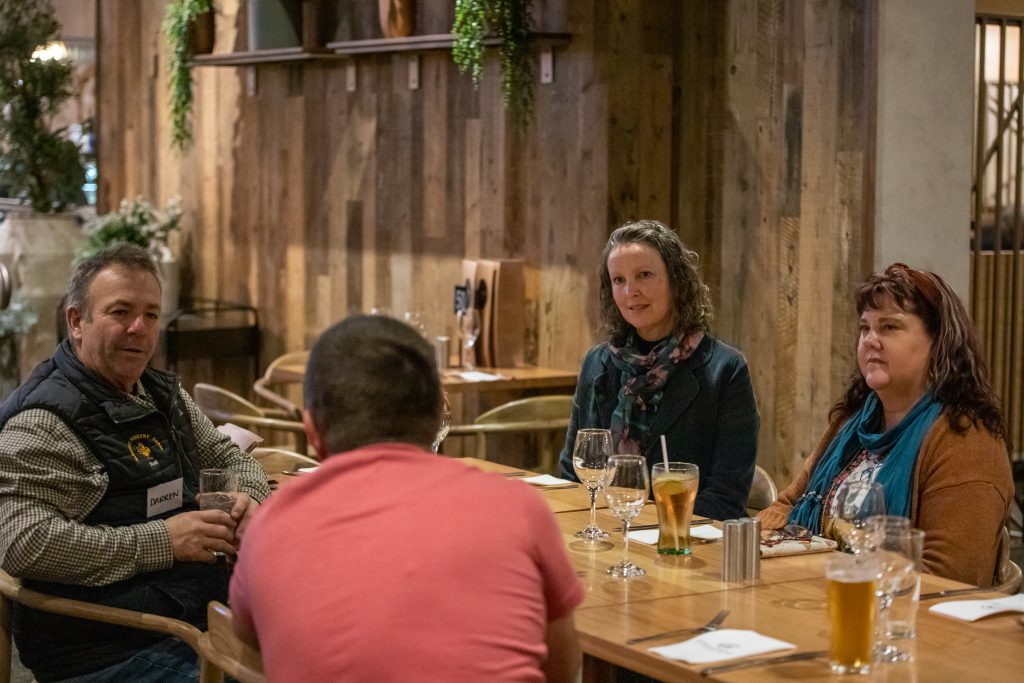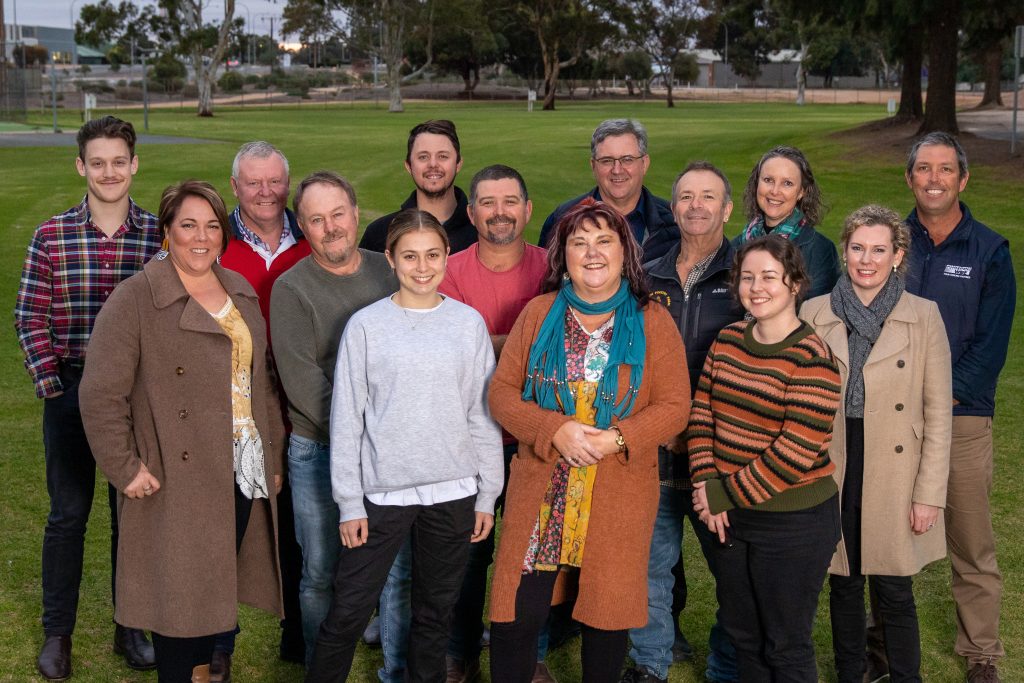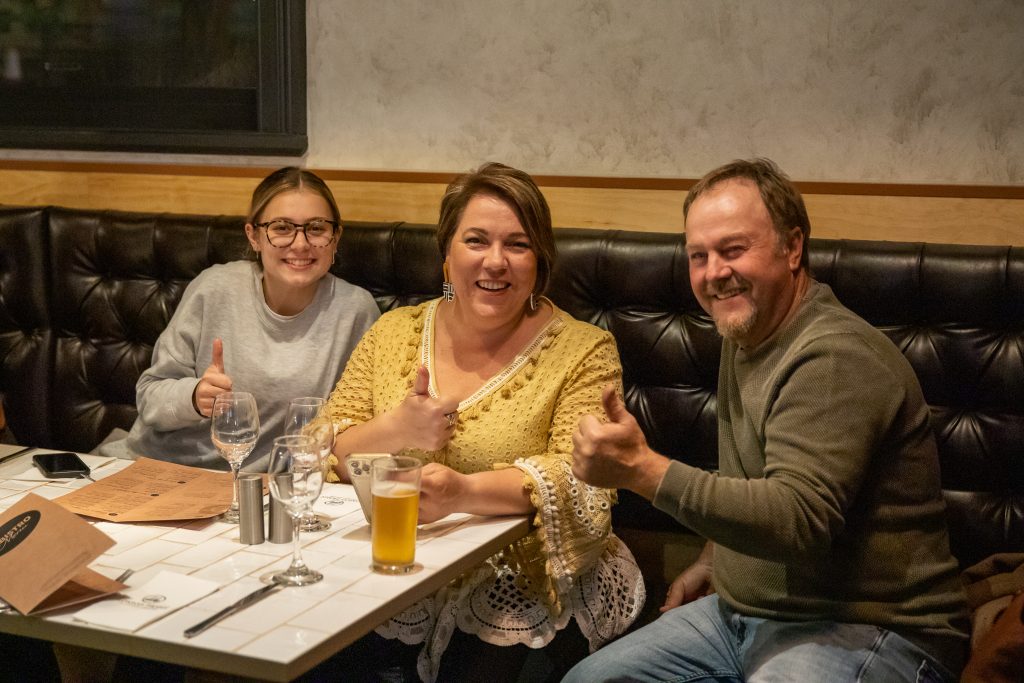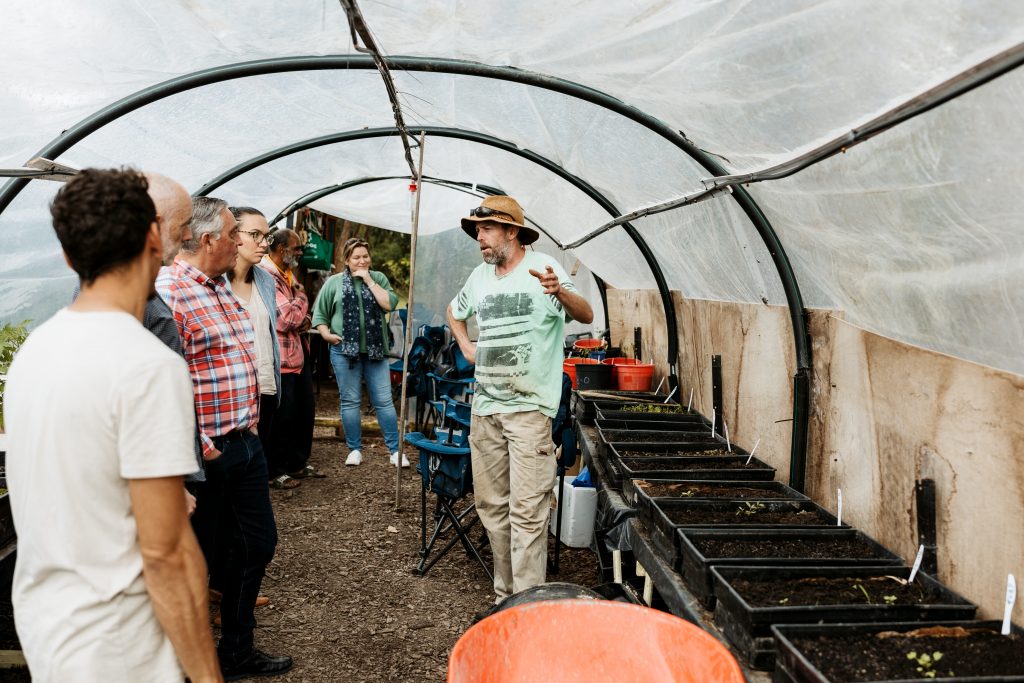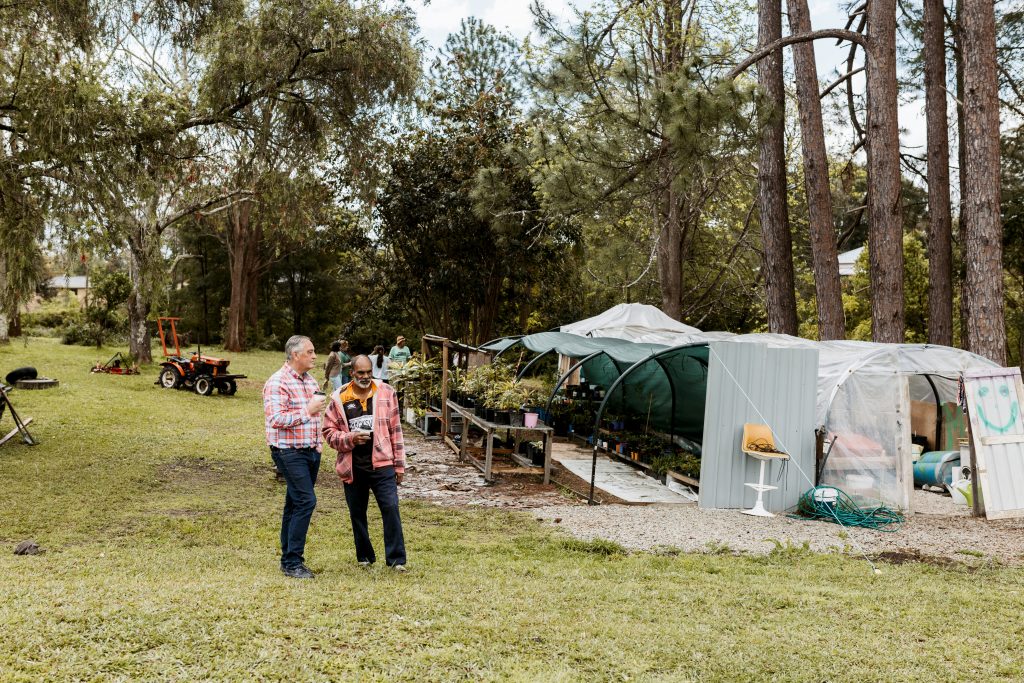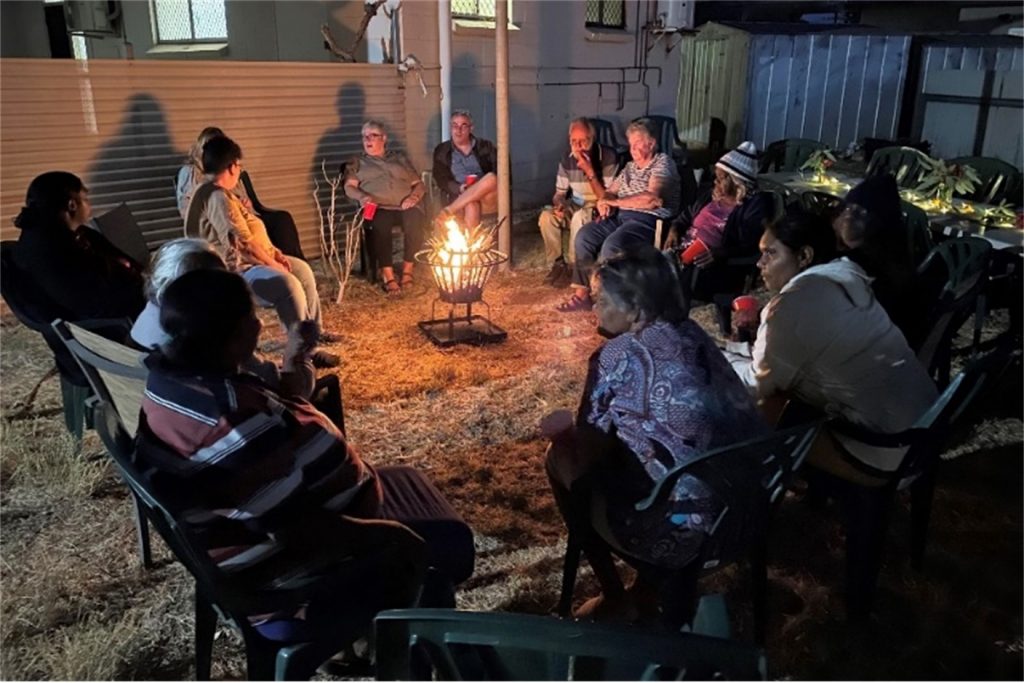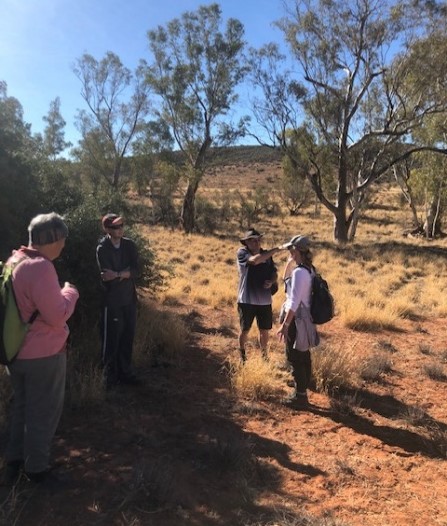Foundation for Rural & Regional Renewal (FRRR)
On Ngadju Country
Late 2019 / early 2020 saw 13 bushfires devastate approximately one million hectares of Ngadju country in southern WA, including large tracts of the Great Western Woodlands, the largest temperate woodland remaining on Earth. It is estimated that the extent of the area of Ngadju country impacted by the fires was equivalent to about half the size of Victoria. The bushfires burnt tracts of old growth forest, overran spiritual sites and destroyed the habitat and nests of threatened species.
Ngadju Conservation Aboriginal Corporation (NCAC) works with the Ngadju community to increase the understanding of conservation and land management opportunities and assist in building capacity to achieve them. Ngadju Rangers use cultural knowledge, refined over thousands of years, to care for the environment and work on Country to manage fire, feral animals and weeds, and to protect mijalkarru (rockholes), the Granites, water places and the flora and fauna of the Great Western Woodlands and the Nullarbor plains.
Following the fires, NCAC received a $25,000 Strengthening Rural Communities grant funded by IKEA Australia through FRRR to help the Ngadju Rangers to both repair the damage and undertake work to protect the environment and cultural sites from the devasting impact of the bushfires. Their approach involves a detailed program of cultural burning to protect sites, old growth and water trees. The mosaic effect of landscape-scale burning benefits biodiversity by reducing the extent and severity of large-scale fire and creates a range of vegetation growth stages and habitats that suit different species. Prior to a burn, Ngadju Rangers and Elders walk through the planned burn site to survey for cultural and environmental values. However, access to the tracks leading to these sites were heavily impacted by the recent fires and also from years of neglect.
NCAC used the grant to commission a specially fabricated trailer with hydraulic tipping for use with their tractor to help the Rangers clear the tracks, enabling safe access to undertake their important cultural and environmental work. This improved access will also allow other Ngadju community members to attend sites and undertake voluntary maintenance and management, which will help them reconnect with Country and transfer knowledge across generations.
Helen Langley, NCAC’s CEO, said that the project wasn’t without its challenges.
“The challenge was the amount of time it took for the trailer to be fabricated and then wired. It took eight months for the trailer to be built and we have only recently received delivery. We are developing Safe Operating Procedures and have organised training for the Rangers so that we can commence clearing tracks and making fire breaks around areas of mosaic burns.
“We are proud that the Ngadju Rangers can now access their Country for cultural burning and they can use machinery to make fire breaks. The project has assisted in rebuilding the Ngadju community and provided healing for community who are mourning the loss of Country.”
For more inspiring stories like this, head to our FY 2021/22 Annual Review.
On Yued, Amangu, Badymia and Widi Country
Carnamah is a town and farming community 300 km north of Perth in WA. Located on Carnamah’s main street, The Exchange is a repurposed heritage building that has been transformed into a multipurpose community and visitor centre. Run by North Midlands Project Inc, it is a not-for-profit arts, culture, history and heritage organisation working towards happy, healthy communities and vibrant, connected towns. They deliver activities across the North Midlands – the seven regional local government areas of Carnamah, Coorow, Mingenew, Morawa, Perenjori and Three Springs.
The Exchange is used on a weekly basis as the home of a local painting group, writing group, youth coding club and the regional Five Gums Scout Group. The space is also utilised for the delivery of many other community workshops and events facilitated by North Midlands Project – all of which are provided to the community free of charge to ensure they are accessible.
North Midlands Project received broad community feedback that people loved The Exchange, especially its welcoming vibe, but that it got too hot in the back section of the building during the warmer months. On occasion, Carnamah is the hottest place in WA, with summer temperatures averaging 36 degrees. This heat renders the space unusable for the best part of four months in the year.
The management committee received a $10,000 Strengthening Rural Communities grant, funded by Australia Post, to contribute to the cost of installing two large air conditioning units in the back section of The Exchange. This has transformed the space into one that is now utilised by the community for workshops, events and other activities right throughout the year.
David Bright, Executive Director of North Midlands Project, said that they are very happy with the outcome.
“Our many, many thanks to FRRR and Australia Post. The grant is enormously appreciated and will have an ongoing impact to our broader community.”
For more inspiring stories like this, head to our FY 2021/22 Annual Review.
On Ngarluma Country
Roebourne is a town in the Pilbara region of WA with a largely Aboriginal population. Police have observed a real gap in meaningful engagement with the youth of this community and a lack of opportunities to build their skills, confidence and positive decision making.
Big hART is an organisation that uses art as a catalyst for change. Over the years, Big hART has demonstrated its ability to engage and work strongly with young people and across different levels of community, with strong outcomes as a result. Their grassroots style of engagement, working directly with young people, has a huge impact on the social and community issues that face Roebourne as an Aboriginal community. The outcomes of the many programs, workshops and high production value events that have been created in partnership with Big hART have been profoundly life changing for many young people in the community.
Young people in the Pilbara have created a future focused, ground breaking digital education resource that celebrates living culture and supports teachers with an energetic mode of online learning. In 2020, Big hART received a $10,000 grant from the Westpac Foundation Community Grants program to train and create paid employment for four young adults in the Pilbara to deliver this Indigenous education resource live to classrooms nationally.
Known as the NEO-Learning project, Big hART created tailored training and professional development opportunities for the four trainees, who were individually mentored with a view to longer term employment, to deliver the NEO-Learning resource to schools nationally. The traineeships offered tangible career paths giving them strong digital skillsets and practical industry experience that included digital drawing and music delivery skill building, virtual education delivery, media and communications, and presenting and public speaking. These activities and tasks were mentored by professional producers and creative industry practitioners, through a task focused workshop program.
The outcomes from the project exceeded expectations, with incredible results for some of the trainees, one of whom was Simara, a young Aboriginal woman from Roebourne. She was part of the digital training program, and said that during the program, she grew in confidence and felt excited for her future and career path.
Sam Hawker is the National Producer for Big hART. She said that while creating peer to peer educational content, Simara displayed an excellent eye for framing and observation.
“We have been able to foster her passion for photography over the last 12 months, providing opportunity for Simara to build technical skills and refine her creative practice. To amplify her achievements, we delivered professional development workshops, leading to her art being selected at the prestigious Revealed Exhibition hosted by Fremantle Arts Centre in Perth. Big hART supported Simara throughout this process, from initial conversations with Fremantle Arts Centre to the development of an artist statement, workshops on licensing, contracts and payments. Over the course of the Exhibition, all of Simara’s artworks sold, including one being purchased by the WA State Government for display in Dumas House in Perth.
“As Simara’s confidence in photography continues to grow, she has become a very important role model and mentor for her peers and community.”
Simara also completed media training under the mentorship of Big hART’s Media Manager and implemented this training in conducting interviews with her community. Big hART also helped Simara to obtain her Driver’s License, an essential qualification for employment in the region.
“Being employed as a trainee with Big hART was a great experience for me, as I gained a lot from supporting children and being a mentor and leader for them… this work helped me learn my identity and aspirations. It has made me look for other challenges and opportunities in my life,” Simara said.
For more inspiring stories like this, head to our FY 2021/22 Annual Review.
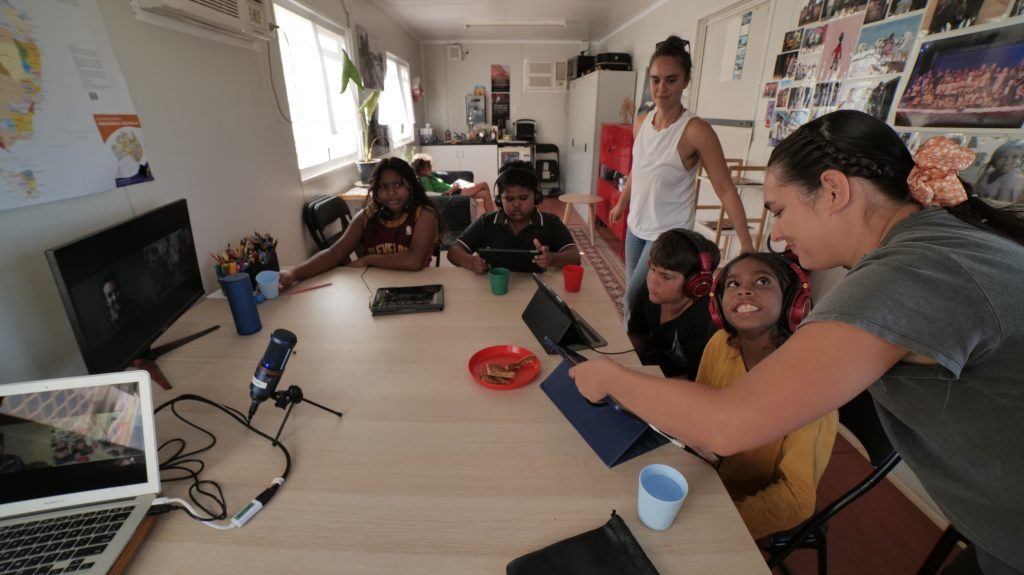
On Ngaiawang Country
The Morgan Volunteer Support Group is a not-for-profit organisation that delivers Meals on Wheels Monday to Friday including public holidays, for the Morgan, Cadell and Mount Mary areas in SA’s Riverland region. The Meals on Wheels service, which has run for more than 35 years, is invaluable for those requiring assistance to remain in their homes for as long as possible, as well as those who have problems such as a broken limb, drug rehab or failing eyesight, which diminish their ability to shop and cook. Additionally, Meals on Wheels delivery offers important social contact for people who use the service and may otherwise be socially isolated. This is of particular concern for those living in regional areas.
The Support Group has partnered with the local prison training program to cook the meals. This not only helps them gain skills for a future trade, but participants also gain satisfaction from helping the community.
In the past, the Morgan Meals on Wheels service used a car owned by Meals on Wheels SA. However, they wanted to sell the vehicle and instead have volunteers use their own cars. After some discussion, Meals on Wheels SA agreed to retain the vehicle for a further three years, to give the Morgan volunteers time to raise funds to acquire a vehicle of their own. Otherwise, the service would most likely cease.
This was also an opportunity to purchase a newer, more reliable, efficient and safe vehicle, as the car they were using was more than 10 years old. The Morgan Volunteer Support Group undertook a lot of local fundraising and secured a $10,000 grant through FRRR’s SRC program, thanks to the support of the Kellogg Australia Charitable Foundation. With COVID causing supply-chain issues, demand for second-hand vehicles was high but after much searching, they purchased a second-hand Toyota Camry Ateva. It met most other requirements – most importantly room for hot boxes, baskets and eskies.
In addition to using it for Meals on Wheels delivery, the group is also seeking to expand their delivery services. They also have plans to make the vehicle available at other times to offer transport solutions to the community, raising additional funds for the Support Group, at the same time as offering a valuable service for those who can’t drive or don’t own a car.
The group is rightly proud of what they achieved, on time and on budget.
“We had help from many different groups – Waikerie Men’s Shed, Waikerie Woolworths, Morgan Friendly Grocer, Morgan Roadhouse, Morgan Home Hardware, Morgan Commercial Hotel, Morgan Cadell Golf Club and hundreds of individuals.
“The car has been operational since March 2022 and is working well. We have been delivering meals for Meals on Wheels and for Morgan Activity Centre. Current customers can be assured of an ongoing service,” said Jakob Gamertsfelder, Secretary / Treasurer of the Morgan Volunteer Support Group.
For more inspiring stories like this, head to our FY 2021/22 Annual Review.
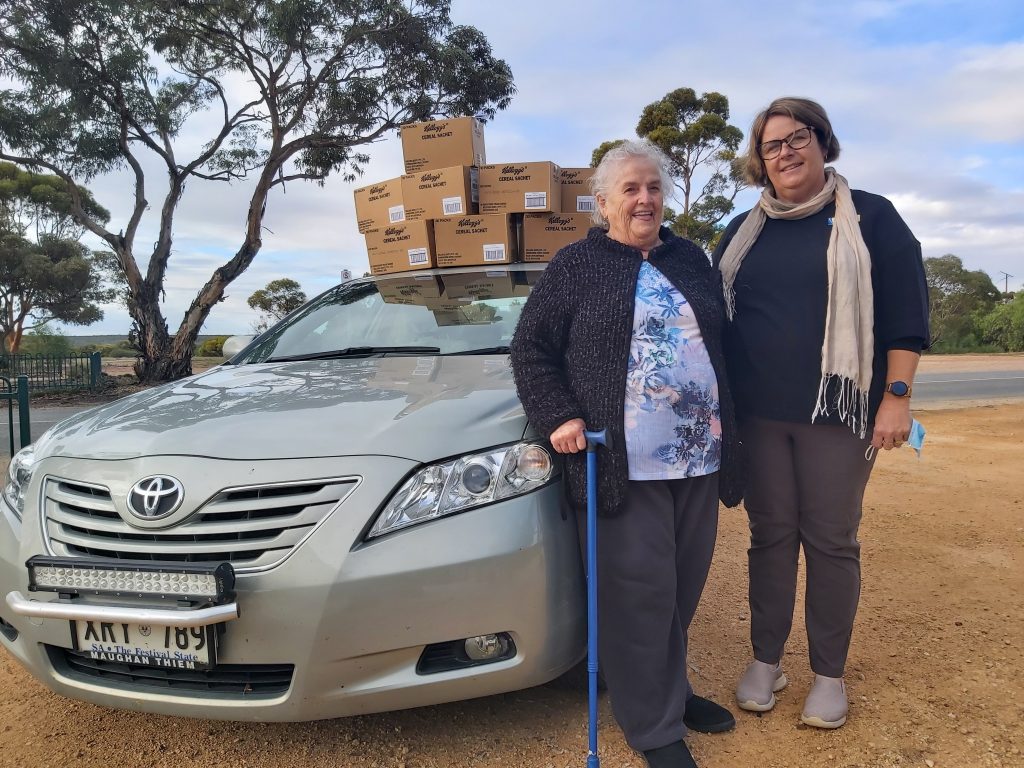
On Ngadjuri, Peramangk and Kaurna Country
The Barossa Valley in South Australia is a renowned wine-producing region northeast of Adelaide. When the COVID pandemic hit, tourism and wine exports significantly decreased, which placed a big financial stress on families in the Barossa. With the added pressure of drought, the region was seeing distressing numbers of mental health incidents and homelessness impacting the community.
Not-for-profit organisation Foundation Barossa has been working hard in the region since 2002 to encourage and support philanthropy to build and nurture their own community’s strength and assets. In recent years, Foundation Barossa has worked closely with several schools in the area where extra support is needed.
Foundation Barossa has been a big supporter of FRRR’s Back to School (BTS) program for a long time, and liaise with school principals and school welfare teachers to ensure that families in need receive the extra support they require.
Five hundred and fifty vouchers worth $50 were distributed to 13 schools, both primary and secondary, for the 2022 school year, thanks to the Fire Fight Australia Fund and a private donor who support FRRR’s BTS program. Students could use these vouchers to purchase school supplies like uniforms, stationery, lunchboxes and anything else that would make their education experience easier and relieve some of the financial pressure from families.
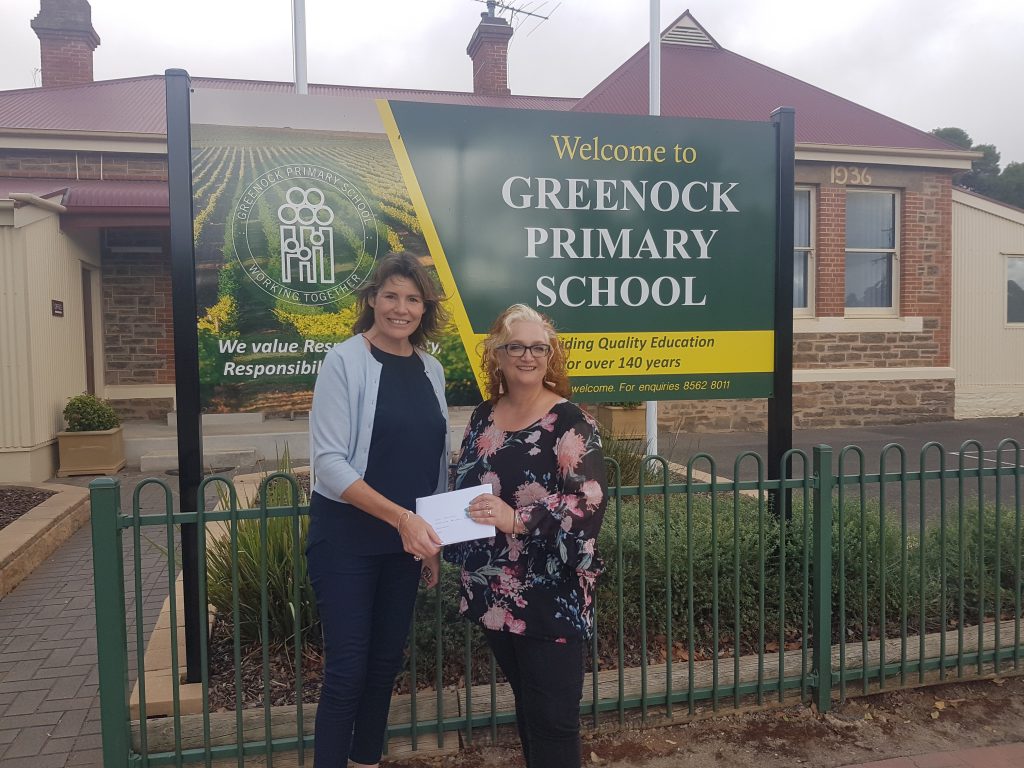
Together with matched funding provided by the Origin Energy Foundation through FRRR and local sponsorship from Barossa Real Estate, a further 203 vouchers were distributed, bringing the total to 753; the Foundation’s highest number to date. The success of the voucher rollout has been measured through an increase in student attendance and retention, and in general an improvement in student wellbeing. The Foundation has also noted a big benefit to the teachers at these schools who would sometimes become distressed or concerned for their students.
Here are some of the happy testimonials:
- “I would like to say thank you very much for choosing our family to receive the vouchers from Foundation Barossa. I lost my job back in October and am a sole parent. My pride was allowed no place when my boys handed them to me. Having only found a part-time job in the last week means the vouchers were very much appreciated and unexpected.” – Parent, Nuriootpa High School & Flexible Learning Centre
- “Teachers were very grateful and expressed they felt better going into the school holidays knowing that students had access to vouchers.” – Nuriootpa Primary School
- “Thank you so much for the Kmart voucher. My daughter purchased a new pencil case and pencils for schools. She thought Christmas had come early!” – Parent, Tanunda Primary School
- “We had a family arrive at our school at the beginning of term 2 who were homeless and living in a caravan with family members. On the first day when we met the mum, we gave her a voucher for each student to help get them some school supplies. She was so thankful that she was brought to tears, as she said they needed new school bags and she would now be able to get those.” Kapunda Primary School
For more inspiring stories like this, head to our FY 2021/22 Annual Review.
The Loxton region of South Australia is the central hub of the grain producing area of the Northern Murray Mallee but also produces a range of other crops including citrus, wine grapes and almonds, as well as livestock. However, this productive region experienced three years of drought between 2017-2019 and, at the time this project was put forward, was in its fourth year of drought, with more than 2,000 farming business affected.
Farmers and regional communities more broadly, face numerous barriers to accessing traditional forms of mental health support, due to reduced access to health professionals in rural areas, long waiting lists, stoicism, stigma around mental health and a tendency to minimise problems. There is often distrust of many health professionals and hesitancy in engaging with mental health services, who farmers perceive as not understanding their way of life.
Given these issues, and the significant impact that long-running dry had on the whole community, wellbeing had been a significant focus in the Loxton community. For example a sell-out musical, ‘Kick Off Ya Boots’, written by local farmer John Gladigau, and performed by locals, had successfully started conversations about mental health and wellbeing. The success of ‘Kick Off Ya Boots’ prompted Dr Kate Gunn, Clinical Psychologist, Founder of ifarmwell.com.au and Senior Research Fellow in the Department of Rural Health at the University of South Australia (UniSA), to continue working with locals, including the ‘Kick Ooff Ya Boots’ team, to implement what became known as the Vocal Locals project. In addition to providing a way for the community to better support one another, it was also an opportunity to further research the uptake of health and mental-health promoting behaviours within communities, especially as droughts are expected to increase in their frequency and intensity in coming years.
Supported by a $148,250 grant through the Future Drought Fund’s Networks to Build Drought Resilience program, this project was co-designed locally to enhance drought resilience by strengthening the capacity of professional, social and community networks in Loxton. The aim was to support mental health in local networks by training local ambassadors (i.e. the Vocal Locals) at events and via the freely available ifarmwell modules, and then supporting them to pursue their own wellbeing goals with a local wellbeing coach, and post about what they were doing for their wellbeing on social media.
In addition to drawing on many years of research in this field, conducted by Dr Gunn and her team, the approach built on the local success of a musical written by Loxton farmer John Gladigau, who agreed to act as the Program Coordinator. His musical ‘Kick Off Ya Boots’ celebrated rural life, explored challenges commonly faced by farming families (e.g. succession planning) and with guidance from Dr Gunn, incorporated wellbeing messages and tips to cope with difficult circumstances. The logic was that it would be powerful if individuals from the region saw similar wellbeing messages being reinforced by multiple local people they know.
There were five parts to the Vocal Locals project:
- Training: Ten ‘Vocal Locals’ and 17 other community members participated in a half-day mental health knowledge and skills workshop. A further half-day session for the Vocal Locals helped orientate them to how the Vocal Locals campaign would work, including how to brush up on their social media skills. The Vocal Locals also completed the five, freely available online ifarmwell modules, a tool for reducing distress and improving mental wellbeing among farmers, and encouraged others to do the same.
- Wellbeing coaching: Vocal Locals each completed eight wellbeing coaching sessions designed to help them pursue their own wellbeing goals, and post about them on social media.
- Social media posting: The local volunteers posted roughly once a week on social media about their wellbeing journey, and there was a public Facebook group created which attracted 870 followers, with 6,800 people reacting to, commenting on, or sharing the posts.
- Communications campaign: A broad communications campaign included a flyer drop to 2,500 households in Loxton, a two-page spread in the Riverland Football League match day program, interviews on local community radio, articles in The Murray Pioneer and the Stock Journal. The ifarmwell team also supplemented Vocal Locals’ posts on the public Vocal Locals Facebook page, with posts communicating six key wellbeing messages in different ways.
- Campaign dinners: Vocal Locals attended three dinners with the project team, with the last also involving family members and support people, and representatives from local organisations and government.
In an article written by ABC Digital, John Gladigau said it had been great to continue the conversations sparked by his musical.
“While these are not taboo subjects, we don’t talk a lot about mental health and wellbeing,” he said. “However, people are willing to [share] if they have the opportunity to.”
Mr Gladigau said he and Dr Gunn had been impressed with how open the participants had been in talking about their struggles.
“Even some of the really tough times… people have related to that and have jumped on and talked about their own experiences and encouraged each other. I think it’s about normalising those conversations,” he said.
Dr Gunn explained that the campaign was designed to operate at two levels.
“At an individual level, the initiative provided the Vocal Locals with the opportunity to learn more about mental health and wellbeing, and strategies that can help improve it, and to work towards their own wellbeing goals. At a community level, the initiative was designed to share practical, evidence-based strategies to help community members improve their wellbeing, increase their understanding of how to achieve positive mental health and wellbeing, and normalise talking about mental health and wellbeing and supporting others to improve their wellbeing.
“We have also been blown away by the creative ways that Vocal Locals used their role to get messages about mental health out into the community. They shared information about the initiative in their workplaces, sporting groups, farming systems groups, and agricultural bureaus for example. One Vocal Local who is also an egg producer, printed short messages on his eggs to raise mental health awareness – for example, one message was “give it a crack”. Another Vocal Local who included a photo of his ram wearing a Vocal Locals hat on the front cover of his ram sale catalogue spoke about the campaign to an audience of 80-100 local farmers just prior to the ram auction. The initiative has had such a profound impact on another Vocal Local that he pitched a radio segment to local community radio, to bring people together to share stories and talk about the ups and downs of being human. We are really proud of the impact that it had.”
Dr Chloe Fletcher, Research Associate, UniSA added that, “Our evaluation of the impact of the project in the Loxton community showed that there were statistically significant increases in the number of conversations people were having with others about mental health and wellbeing, their comfort in speaking to others about mental health, and their engagement in wellbeing activities.”
WATCH THIS VIDEO to see what the group said about the experience.
For more inspiring stories like this, head to our FY 2021/22 Annual Review.
In the last few years, bushfires, floods and other extreme weather events have become more common in parts of Australia. In South Australia, people living in metropolitan and remote, rural and regional areas have become more accustomed with these types of events hitting their communities. Preparation and planning is key to ensuring minimal damage to human life and infrastructure. But for people living with a disability preparedness can sometimes be tricky – especially if important messaging isn’t accessible.
As of 2015, there were nearly 200,000 people in South Australia living with deafness or hearing loss (2015 National Health Survey, ABS). In times of emergency when clear communication is vital, there is a large window for confusion when first responders are unable to communicate with residents in disaster-affected areas. To close this gap, Deaf Can:Do developed the Talking Hands for Frontline Responders project.
Using a $25,000 grant through the FRRR News Corp Bushfire Fund program, the aim of the project was to provide training to South Australian Country Fire Service (SA CFS) volunteers across the state to effectively communicate with the deaf and hard of hearing community by teaching them basic AUSLAN skills and other ways to communicate.
Unfortunately, COVID and an active fire season meant SA CFS had reduced capacity to help co-design the learning content. With permission from FRRR, Deaf Can:Do redirected a portion of funding to purchase a Learning Management System authoring tool. Staff were upskilled in the use of this tool, so that learning design and course builds could be completed internally. The tool allowed for the sharing of content and proposed course materials via a simple link that updated in real-time, which led to ease of communication around changes required, and ultimately supported tailoring content for the target audience. The co-design process greatly benefited from this. The course was finalised internally at Deaf Can:Do, and then exported into CFS’s own learning management system with their support.
During the consultation and content development period, the CFS identified that volunteers would benefit from communication skills and strategies training as well as Auslan language training, so the scope of content was broadened to include this identified need. CFS also provided feedback around specific needs of volunteers, English literacy considerations and accessibility to information.
As a result, the seven module course introduces learners to some simple Auslan that has been tailored to the needs of the CFS, and covers which skills and strategies are most appropriate for different community members, as well as some common mistakes to avoid. The training includes Auslan videos, interactive quizzes, interactive simulations and more to guide learners through the course, as well as links to further resources.
The e-learning course now features on the CFS’s learning management system, and is available to all volunteers across the service. The training, which can be completed at any time, provides basic but important skills that allow CFS volunteers to successfully communicate relevant and important information to the deaf and hard of hearing community. This successful project will have several positive impacts on South Australian communities in times of disasters. Volunteers can now confidently communicate to people living with hearing impairments, and it will also build relationships between these community groups and help spread useful information to other people. The program can also be rolled out to CFS groups across the country which will play a major role in disaster preparedness nationally.
Feedback was collected from the volunteers who participated via a survey link embedded in the course. The response was a strong “Very Useful”, while others felt that the practical advice like using a mobile phone to write was very helpful too.
For more inspiring stories like this, head to our FY 2021/22 Annual Review.
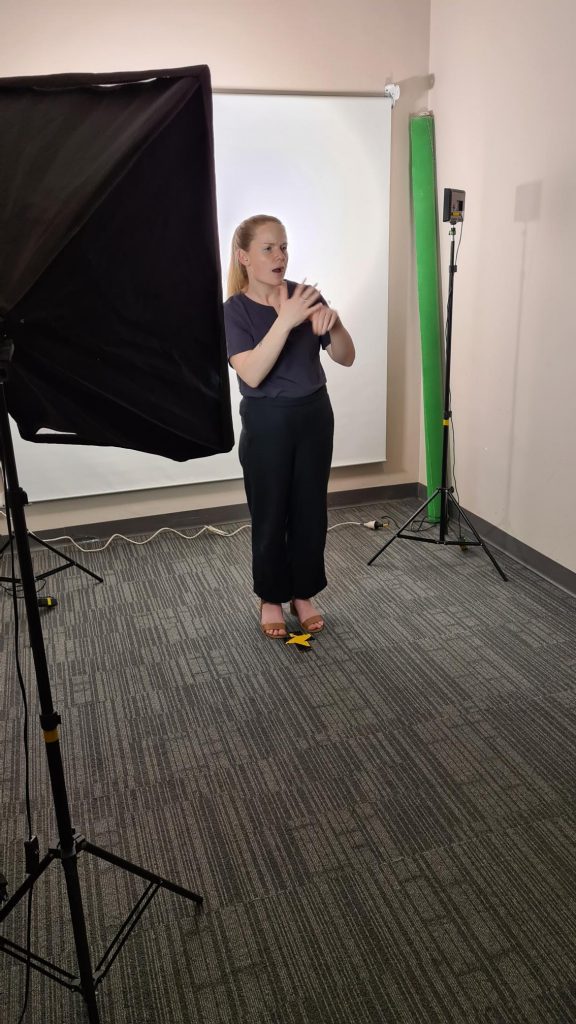
On Gumbaynggirr Country
The Nambucca Valley in NSW was one of the first participating communities in the Investing in Rural Community Futures Program, which FRRR has been running with the support of VFFF since 2019. The program aims to help local not-for-profit organisations build their capacity so that they can better support the communities they serve.
One such group is Mujaay Ganma Foundation, which was established in memory of two strong, proud Gumbaynggirr women – Mardi Walker, Mujaay and Florence Ballangarry, Ganma. The Foundation grew from the need to bring back cultural strength and trust to people and families who are dealing with cancer. But it’s grown to offer far more than that, supporting Aboriginal people and their families with culturally friendly, emotional, physical and spiritual support. Through culture and sustainable practices Mujaay Ganma also endeavours to support a healthy lifestyle in the modern Nambucca Valley.
One of Mujaay Ganma Foundation’s goals is to create the Yuraal Guunumba Ngurraay: Gumbaynggirr Native Foods Community Garden Project, which will improve the wellbeing of local Gumbaynggirr Country and community. The garden will be a space where Elders can share cultural values and pass on traditional knowledge and skills to younger generations. It will also encourage students and youth to learn about native forest and riverbank regeneration and ecosystems. There is also a plan to help young people learn the identification and properties of native plants needed for regeneration of degraded country, seed collection and propagation and nursery management skills. Ultimately, this will ensure the passing on of cultural knowledge from Elders and promote its value to the wider community. In addition, the hope is that the garden will help to connect young Gumbaynggirr people to Country, strengthen a sense of community and build the skills of local community members, leading to meaningful employment and freedom from welfare dependence, which contributes to community wellbeing. Importantly it will contribute to a healthy lifestyle, culturally, physically and collectively.
Ultimately the project aims to build the capacity of young Gumbaynggirr people, encouraging them to contribute to a more collaborative and cohesive community. This will be achieved by strengthening the passing on of cultural knowledge between Elders and the younger generations, strengthening pride in culture and in the identity of the young.
Furthermore, the wider Nambucca Valley community would have the opportunity to learn from the custodial people enabling more respectful appreciation for the original culture and abundant natural resources, so sustaining a healthy environment into the future.
However, with only being established in 2019, the organisation recognised that it needed to build its capacity before it could embark on such an ambitious project. By training local Gumbaynggirr coordinators, the project will support community leadership. These trainees could become well versed in project management and able to constructively give back to community in the future. These trainee project coordinators could learn these contemporary skills through being mentored by experienced project managers, learning how to negotiate resources, funds and engaging with other organisations by working with their mentors, learning ‘on the job’, at the same time as being supported in their culture by the custodial Elders of Country. This approach was chosen, as successful learning experiences for community people have involved learning while observing and engaging in doing.
This fit well into the priorities of the IRCF program, which included people, strategy systems and structure and sector efficiencies. They therefore applied to FRRR for a grant to enable them to hire and mentor two Gumbaynggirr people as trainees, who could then take on management of all the complex logistics involved in implementing the Yuraal Guunumba Ngurraay garden project. This was also an opportunity to help ensure that young Gumbaynggirr people are safe, connected to Country and have meaningful work.
With the support of a $38,443 FRRR IRCF grant, funded by VFFF, two trainee project coordinators were recruited and have been learning on the job. Their work has included:
- learning about workplace expectations and creating a culturally safe working environment;
- strengthening their connection to Country and culture, with Elders taking them on Country and experiencing ceremony;
- setting up systems and administrative work, including writing policies and keeping records of the planning and implementation of the many components of this complex project;
- creating a food garden under guidance of a horticultural mentor with experience working in the Aboriginal community at Miimi Aboriginal Corporation, where they learnt about garden preparation, irrigation, planting seeds and transplanting seedlings in preparation for establishing the Yuraal Garden;
- learning about caring for Country from a Traditional Custodian with land management skills; and
- managing a successful Golf and Bowls Day fundraising event, which was successful not just in raising money but in creating an event where community could come together, learn more about Mujaay Ganma Foundation and have a good healthy time together.
The training of the coordinators and the future establishment of the Garden is highly collaborative and involved several community organisations, including:
- Miimi Aboriginal Corporation, who provided continual support of resources and consultation;
- Earth Trust and Yarranbella, with support from Miimi, who mentored the trainee coordinators as they learnt to negotiate and navigate between Aboriginal and non-Aboriginal systems, between organisations and students and teachers;
- Bowraville Innovative Social Enterprise Precinct (BISEP) who helped them negotiate Western institutions and regulations;
- Muurrbay Aboriginal Language and Culture Co-operative who provided continual support of resources and consultation, in particular around language and culture;
- Gagu Land Services will took participants onto Country to help learn about caring for Country and land regeneration;
- Yarranbella Environment Services who provided the horticulturist and registered teacher, who will help develop the training package needed for the garden to be created; and
- Nambucca Valley Council who provided land for where the garden project will occur.
The Foundation was able to leverage the grant to secure wage subsidies and additional funding that meant the trainees have, with guidance, developed job descriptions, run recruitment information sessions, established a viable workplace for new recruits and learnt to supervise new staff.
Janette Blainey, Project Manager says they are proud to still be operating and to have succeeded in expanding.
“This grant we received under FRRR’s IRCF funding gave us the support and improved capacity to successfully apply for a further grant to establish a Native Seedbank and to train other young Gumbaynggirr people in custodial land management.
“While we still face challenges from the impacts of dispossession, racism and continuing colonising attitudes within the community, Mujaay Ganma Foundation has become stronger and better able to contribute more to the community. Our young trainee coordinators are growing in confidence and have pride in their culture and community, and are learning more about their culture and their Country. They are ready to step up when needed. Other young people have acquired knowledge, skills and a positive attitude to gardening an extensive food producing garden for the community to access. We also have two employees who are gaining project coordination skills. It’s also great to see improved relationships between Elders and younger community members.”
For more inspiring stories like this, head to our FY 2021/22 Annual Review.
On Koa Country
Outback Festival Inc is situated in the Queensland outback town of Winton, a 10-hour drive from Cairns. They’re a not-for-profit organisation that was formed in 1972 when the inaugural Winton Outback Festival took place. Since 1973, the festival has been held biennially and has grown from a small-town event attracting fewer than 1,000 visitors to a major regional event that drew in a record 14,976 attendees over the five days – pretty impressive for a town of only 900 people!
With the help of a $45,000 FRRR grant, funded by the Australian Government through the Tackling Tough Times Together program, Outback Festival Inc was able to host one of their largest Festivals capitalising on the holidaying demographic contained to Queensland due to state borders being closed. The theme was ‘Giants of the Outback’ which showcased the story of Qantas and the role that Australia, and the historic town of Winton, has played in the history of air travel.
In 2021, the festival was more crucial to the community than ever, as a lot of locals in Winton and the surrounding towns were feeling socially isolated following the COVID pandemic, not to mention the hit that the economy had taken due to the absence of visitors and tourists.
The festival was hailed an amazing success, with a record 80% increase in numbers that saw upwards of 4,000 visitors book out nearby motels, camping grounds and hotels. Families from all around Queensland road-tripped their way to Winton for an outback school holiday experience.
People from all ages and backgrounds participated in and attended open air concerts, family sports events, arts performances, workshops and even watched a stunning pyrotechnic display.
Winton is known as the birthplace of Qantas and so, to celebrate 100 years of Qantas, a sunset gala dinner with the theme “Centenary of Flight” was held on the Winton airport tarmac with over 300 guests attending along with the 2nd Cavalry Regiment as invited guests.
As a result of the Outback Festival, Winton got a much-needed influx of revenue with more than $1.2 million being spent by attendees during the five days of quintessential Aussie fun. Local business operators reported huge spikes in trading, with some seeing an increase of up to 127%.
For more inspiring stories like this, head to our FY 2021/22 Annual Review.
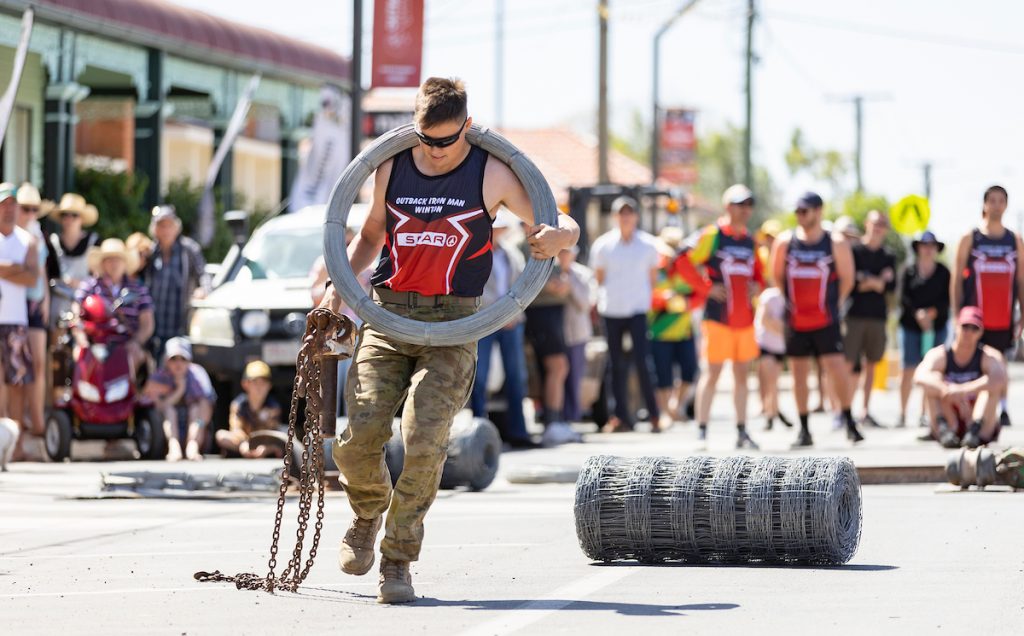 Photos were captured by Barry Alsop of Eyes Wide Open.
Photos were captured by Barry Alsop of Eyes Wide Open.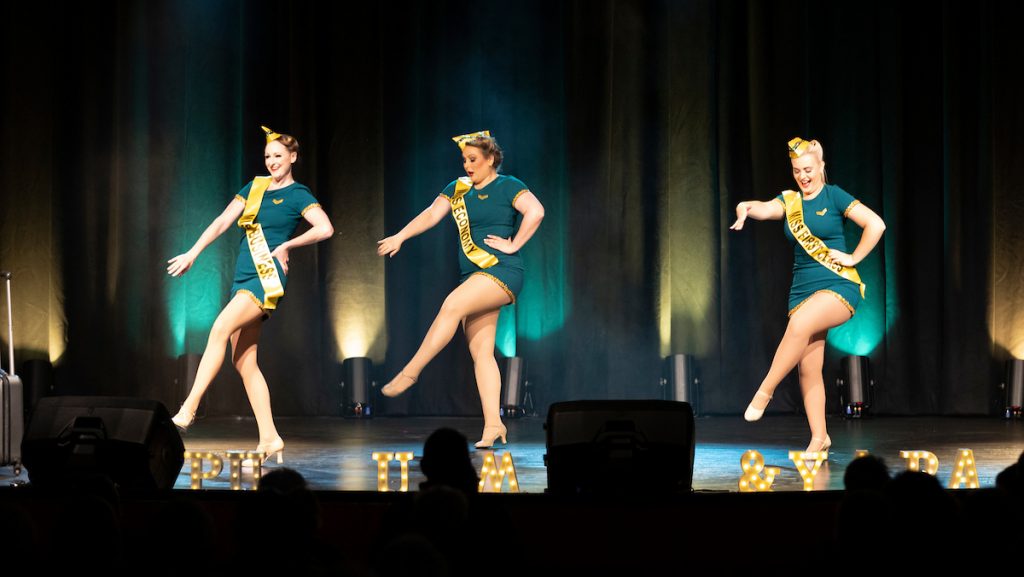 Photos were captured by Barry Alsop of Eyes Wide Open.
Photos were captured by Barry Alsop of Eyes Wide Open.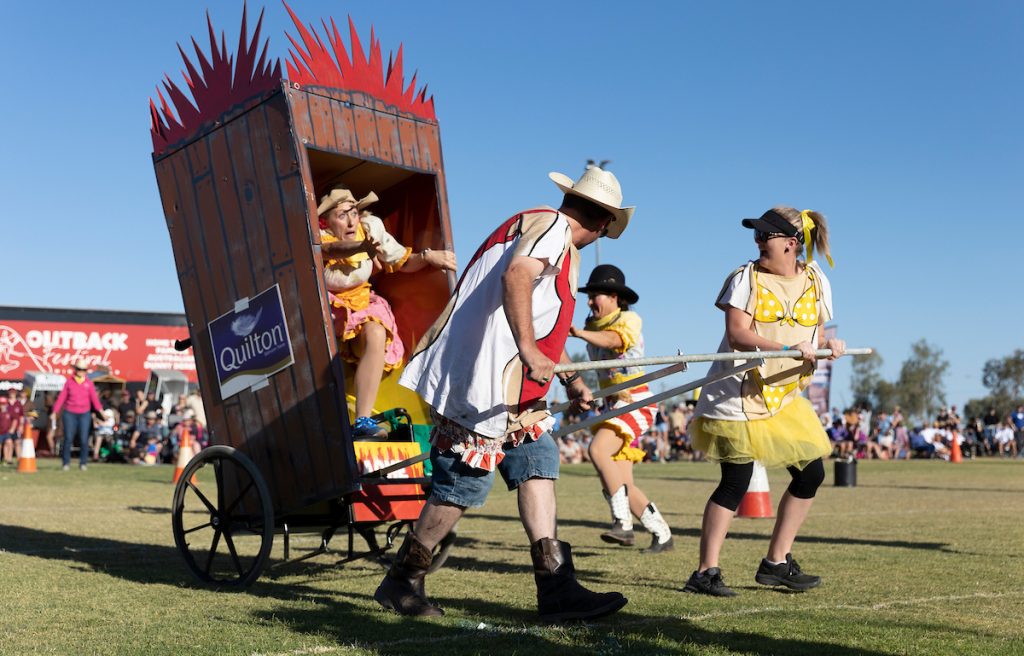 Photos were captured by Barry Alsop of Eyes Wide Open.
Photos were captured by Barry Alsop of Eyes Wide Open.
Eastern Arrernte Country
Ltyentye Apurte Catholic School (LACS) is one of the most successful remote Aboriginal schools in central Australia and the NT. It is the only school serving the 600-strong community of Ltyentye Apurte (pronounced ‘L-Ginga Porter’, which means ‘clump of beefwood trees’ in the Arrernte language) or Santa Teresa. A number of the facilities at LACS are communal, notably the library and computers. The community is 83 km south east of Alice Springs in semi-desert country. Temperatures are extreme, ranging from -1 to 45 degrees but there is year-round access via an unsealed road.
The local Arrernte people are bilingual and speak Eastern Arrernte and English (which is often their second or third language). The Arrernte language and cultural program is a key part of the curriculum at LACS.
In Santa Teresa, extreme socio-economic disadvantage is the norm, with residents and the school facing many challenges, notably extremely poor housing and health, high unemployment with minimal employment opportunities, adults suffering from poor mental health and a high number of students suffering from intergenerational trauma. Remote schools in general have a major issue with teacher retention due to the complex challenges of students and their families. The average stay of a teacher in NT schools is 7 months and 9 months in catholic schools. Existing senior staff frequently work 80 hour weeks regularly wearing multiple hats in part due to a lack of teachers.
According to the Principal at the time, to a great extent, the future of Santa Teresa depends on the school providing the optimum best education for Santa Teresa youth – “To make the remote community of Santa Teresa strong, we must make its school strong.”
There are currently 126 students on roll, from Pre-School to Year 11. They are all Indigenous and bilingual. Most of the teachers at LACS are non-Indigenous and come with a range of experience from mainstream education. The school is also a major employer of the local Arrernte people, with approximately 60% of Indigenous staff filling a multitude of critical support roles. Teachers work as members of a team in partnership with local Indigenous people and Arrernte assistant teachers and tutors.
Isolation and the challenges of living and working in a community context mean that staff need all the support they can get, in terms of building resilience. Ongoing change is the norm, with the last two years (2020/21) seeing significant change and uncertainty. There is often a significant turnover of new staff, which presents additional challenges to building trust and resilient community.
The impacts of these factors are significant, including very high levels of stress, distraction from the mission of educating students, lower engagement, uncertainty about the future, change fatigue, staff burnout, talent loss and lower trust in leaders.
To try to address this, the then Principal knew they needed to help teachers and staff build resilience, sustainable high performance and change agility. They used a $10,000 grant from FRRR, through the Strengthening Rural Communities program, funded by the Tim Fairfax Family Foundation, to run the Resilience Educators Program (REP).
The REP began with all teachers completing a Resilience Diagnostic, prior to a two-day workshop. The Diagnostic measured individual resilience in areas such as emotional regulation, self-confidence, compassion, exercise, sleep and nutrition. Staff then participated in a two-day workshop, facilitated by Paul Salmon, called “Thriving Through Change and Challenge”. Each staff member created three goals to help improve their resilience and the option of having an accountability buddy or sessions with a resilience coach to support them in reaching their goals.
After the workshop, the teachers were given access to an app, which provided a detailed resilience report and materials to develop new skills. They also committed to participating in a range of activities as groups of staff and the whole staff community, such as an evening walking group, weekend trips away and a regular BBQ breakfast. This was followed up with a visit from the Resilience coach, which led to three shared goals being created.
Despite challenges in rolling this out due to the pandemic and its subsequent impacts, staff collaborated to implement wellbeing activities based on their learnings from the workshops and the ongoing use of the Resilience App. They continue to come together as a community to support one another in challenging times.
The outcome has been an improvement on the health and wellbeing of the whole community.
“All staff became more aware of the importance of resilience and the necessity to plan for how to manage stress and cope with the added burden of the pandemic. There is also a greater understanding by leadership of the necessity to prioritise staff wellbeing through strategic planning using an integrated holistic approach.
“It has become part of our school culture for staff to check in with each other on how they are travelling, especially concerning sleep, exercise and levels of stress. It is now becoming part of our meetings to start with a partner check in or short meditation activity. We introduced a new wellbeing curriculum program, MindUp for Life, which not only teaches the knowledge and skills children need to regulate their stress and emotion but also supports teachers in building positive relationships with students and the broader community.
“There is a more holistic focus on wellbeing and resilience with an area created in the staffroom where staff relax and do mindful colouring. Plus, there are opportunities for staff to publicly acknowledge and show gratitude for effort, and pampering products for staff in our rest rooms,” said Pamela Brown, Acting Principal.
For more inspiring stories like this, head to our FY 2021/22 Annual Review.

